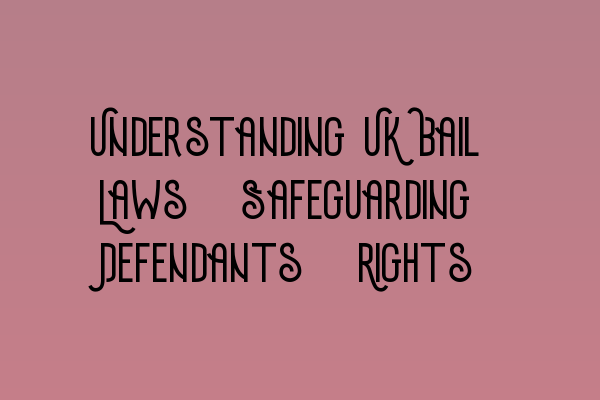Understanding UK Bail Laws: Safeguarding Defendants’ Rights
When a person is accused of a crime in the United Kingdom, they are entitled to certain rights and protections under the law. One of these crucial rights is the right to bail. Bail laws exist to ensure that defendants are treated fairly and have the opportunity to secure their release while awaiting trial. In this article, we will explore the key aspects of UK bail laws and how they serve to safeguard defendants’ rights.
What is Bail?
Bail refers to the temporary release of a person accused of a crime, with the condition that they will appear in court for their trial. The purpose of bail is to strike a balance between the rights of the accused individual and the interests of justice. It allows defendants to maintain their freedom, continue with their daily lives, and prepare their defense while ensuring their presence at court proceedings.
The Process of Bail Hearings
When a person is arrested and brought into custody, a bail hearing may take place to determine whether they should be granted bail or held in custody until their trial. During the hearing, various factors are considered, including the seriousness of the crime, the defendant’s ties to the community, their criminal record (if any), and the likelihood of them absconding or reoffending.
Conditions of Bail
If bail is granted, certain conditions may be imposed upon the defendant. These may include surrendering their passport, reporting to a police station regularly, or residing at a specific address. Such conditions aim to address any concerns regarding the defendant’s potential flight risk or the safety of the public.
The Importance of Legal Representation
Having legal representation throughout the bail process is crucial for defendants. A skilled criminal defense solicitor can argue for bail, present compelling evidence, challenge the prosecution’s arguments, and ensure that defendants’ rights are upheld. It is essential to engage the services of an experienced solicitor who specializes in criminal law to navigate the complexities of bail hearings.
The Impact of Bail Decisions
The granting or refusal of bail can have a significant impact on a defendant’s case. If bail is denied, the defendant will remain in custody until their trial, which can adversely affect their ability to prepare their defense effectively. On the other hand, if bail is provided, defendants can maintain their freedom, carry on with their lives, and better assist their legal team in building a robust defense strategy.
Preparation for Bail Hearings
Before attending a bail hearing, defendants should work closely with their solicitor to prepare effectively. This may involve gathering character references, providing evidence of stable employment or educational enrollment, and addressing any concerns that the court may have regarding potential flight or reoffending.
Conclusion
Understanding UK bail laws is vital for defendants who wish to safeguard their rights and secure their temporary release while awaiting trial. Bail hearings require careful preparation, skilled legal representation, and a thorough understanding of the factors considered by the court. Engaging the services of an experienced criminal defense solicitor is crucial to navigating this complex process successfully.
If you’re preparing for a career in criminal law and need additional resources, be sure to check out our related articles:
- SQE 1 Practice Exam Questions
- SQE 1 Practice Mocks FLK1 FLK2
- SQE 2 Preparation Courses
- SQE 1 Preparation Courses
- SRA SQE Exam Dates
